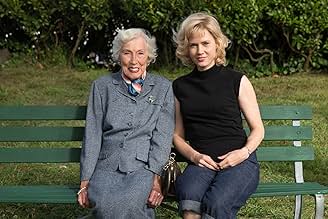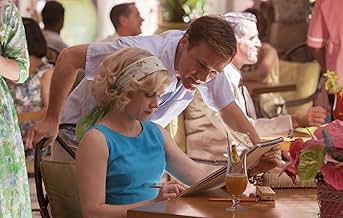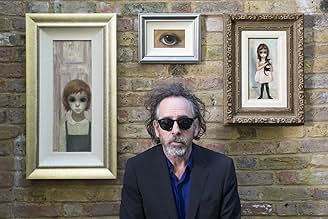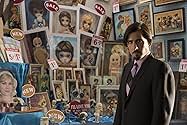IMDb रेटिंग
7.0/10
1 लाख
आपकी रेटिंग
चित्रकार मार्गरेट कीन की अभूतपूर्व सफलता, और बाद में पति के साथ हुई कानूनी कठिनाइयाँ, जिसका कहना था, कि वो चित्र उसने बनाए थे.चित्रकार मार्गरेट कीन की अभूतपूर्व सफलता, और बाद में पति के साथ हुई कानूनी कठिनाइयाँ, जिसका कहना था, कि वो चित्र उसने बनाए थे.चित्रकार मार्गरेट कीन की अभूतपूर्व सफलता, और बाद में पति के साथ हुई कानूनी कठिनाइयाँ, जिसका कहना था, कि वो चित्र उसने बनाए थे.
- 2 BAFTA अवार्ड के लिए नामांकित
- 3 जीत और कुल 18 नामांकन
Emily Maddison
- 2nd Olivetti Girl
- (as Emily Bruhn)
फ़ीचर्ड समीक्षाएं
"Big Eyes" was nominated under Comedy & Musical category during the last Golden Globe Awards. Lead actress Amy Adams even won the Best Actress prize for starring in it. While I was watching this film though, it turned out to be furthest from what I had in mind for a comedy. The topic of this film was actually disturbing and depressing. However, being a Tim Burton film, there was certainly dark humor to be had.
This film is a biopic of 1950s novelty pop artist Margaret Keane (formerly Ulbrich, nee Hawkins). She developed a series of haunting acrylic paintings of kids with big dark round eyes. Walter Keane, her rascal salesman of a husband, took advantage of the rising popularity of her paintings. He claimed and mass-marketed them as his own.
Meanwhile, timid Margaret was forced to conform to his web of lies. She was locked in her workroom in their home to paint even more Big Eyes, away from the prying eyes of the public, and even her own daughter. Will Margaret be able to break free from the prison she has trapped herself into?
Amy Adams quietly carried this film capably on her shoulders. There was nothing funny about what she had to do here as Margaret. Her character was the victim of a most cruel crime. Her husband stole not only her art, but also her confidence, and her very freedom. Adams played a weak character, but as an actress, Adams was anything but. With her wise underplaying, Adams successfully won our empathy and compassion for her difficult plight.
Christoph Waltz, on the other hand, was over-the-top, one-dimensional, practically cartoonish, as the manipulative con-man Walter. From his very first scene, you already knew this smooth-talking guy was up to no good. Up to his very last scene in that courtroom, Waltz's Walter was a manic caricature, never really coming across as a real person at all. This may well Tim Burton's direction in play, as this character Walter was the source of most of this film's black humor. Waltz's fiery interaction with Terence Stamp's harsh NY Times art critic character is most memorable as well.
This film's narrative was simple and straightforward. Yet because of Amy Adams' riveting and heart-rending performance, we will be held until the compelling end. The technical aspects of the film, particularly the pastel color palette of the photography, as well as the period production design, costumes and makeup, all contribute to the overall charming look and nostalgic feel of the film as a whole. 7/10.
This film is a biopic of 1950s novelty pop artist Margaret Keane (formerly Ulbrich, nee Hawkins). She developed a series of haunting acrylic paintings of kids with big dark round eyes. Walter Keane, her rascal salesman of a husband, took advantage of the rising popularity of her paintings. He claimed and mass-marketed them as his own.
Meanwhile, timid Margaret was forced to conform to his web of lies. She was locked in her workroom in their home to paint even more Big Eyes, away from the prying eyes of the public, and even her own daughter. Will Margaret be able to break free from the prison she has trapped herself into?
Amy Adams quietly carried this film capably on her shoulders. There was nothing funny about what she had to do here as Margaret. Her character was the victim of a most cruel crime. Her husband stole not only her art, but also her confidence, and her very freedom. Adams played a weak character, but as an actress, Adams was anything but. With her wise underplaying, Adams successfully won our empathy and compassion for her difficult plight.
Christoph Waltz, on the other hand, was over-the-top, one-dimensional, practically cartoonish, as the manipulative con-man Walter. From his very first scene, you already knew this smooth-talking guy was up to no good. Up to his very last scene in that courtroom, Waltz's Walter was a manic caricature, never really coming across as a real person at all. This may well Tim Burton's direction in play, as this character Walter was the source of most of this film's black humor. Waltz's fiery interaction with Terence Stamp's harsh NY Times art critic character is most memorable as well.
This film's narrative was simple and straightforward. Yet because of Amy Adams' riveting and heart-rending performance, we will be held until the compelling end. The technical aspects of the film, particularly the pastel color palette of the photography, as well as the period production design, costumes and makeup, all contribute to the overall charming look and nostalgic feel of the film as a whole. 7/10.
I'm a big fan of Tim Burton and with his latest "Big Eyes" it clearly is not typical Tim Burton it's more of a serious tone and manner it's different from comic book tales and animation of the dark senses and world of Tim. This film is actually a true take on the life and times of female painter Margaret Keane as it's a true tale of discovery, fate and getting to know your world thru the eyes of art. Set in the 1950's California Margaret Keane(Amy Adams)is a single mother who decides to set out on her own as her talents of the brush and drawing is her only hope to earn her bucks for her and her daughter. Upon meeting Walter(Christoph Waltz)a sharp and arrogant know it all showman type, it's under the spell that Margaret soon becomes Mrs. Keane. And success and fame and public notice comes from the couples paintings only the Mr. takes all the credit! This film becomes a legal dispute as who is claiming the work is in question yet you as the viewer know who's best at the brush! Overall nice little sentimental film from Tim it's different yet that's what makes a director and a film work that's a different take that appeals to the big eyes of viewers!
Charming, but uneven, entertaining yet unsatisfying, "Big Eyes" definitely does not come into the category of great or important true story movies. It is clearly a change of style for Tim Burton (if is very relieving not to see Johhny Depp acting all weird), but even though the time at the theater doesn't in any way feel wasted or boring, instead quite pleasant, the movie is too chaotic and quirky for it to be taken seriously in any way.
A premise that has lots of potential is partially wasted in aimless scenes or in repetitiveness. The film doesn't really make a point about anything and has way too much flashy stuff to feel grounded in any way. There would be nothing wrong there, but the fact that in it's uneven tone there seems to emerge a will to give an accurate and worthy recounting of these events makes so much of the drama feel out of nowhere. Storytelling isn't exactly where the movie succeeds. The courtroom scenes are definitely the weakest of all and made me mad multiple times because of their absolute preposterousness.
Anyways, the film is built around a strong enough cast, photography, premise, writing and design that it would be hard to get bored in anyway. The pace is fluent enough and the duration of the film is just about right for the content it presents. I wanted to like this more and see the story be given a better portrayal, but in no way I could say "Big Eyes" was a failure.
A premise that has lots of potential is partially wasted in aimless scenes or in repetitiveness. The film doesn't really make a point about anything and has way too much flashy stuff to feel grounded in any way. There would be nothing wrong there, but the fact that in it's uneven tone there seems to emerge a will to give an accurate and worthy recounting of these events makes so much of the drama feel out of nowhere. Storytelling isn't exactly where the movie succeeds. The courtroom scenes are definitely the weakest of all and made me mad multiple times because of their absolute preposterousness.
Anyways, the film is built around a strong enough cast, photography, premise, writing and design that it would be hard to get bored in anyway. The pace is fluent enough and the duration of the film is just about right for the content it presents. I wanted to like this more and see the story be given a better portrayal, but in no way I could say "Big Eyes" was a failure.
Tim Burton has crafted quite a reputation as a director of the surreal and the macabre. In his films, he conjures up dark, Gothic images of death and despair, but suffuses them with his special brand of bittersweet magic and whimsy. On the surface, Big Eyes is right up his alley - this true story of the fiercest and most outrageous copyright battle in art history centres on a series of big-eyed waifs, almost ghostly figures of hope and horror that fit perfectly into Burton's aesthetic. And yet, barring a few scenes, the final film is curiously characterless: a competently-made, shrewdly- cast biopic that never quite troubles the heart or spirit the way Burton's films can do.
Margaret (Amy Adams) is trying to scrape together a living for herself and her young daughter when she meets Walter Keane (Christoph Waltz), a charismatic real-estate broker who would rather make a name for himself as an artist. He offers her a home, love and financial security, and she quite happily takes his surname as her own. Once they are married, Walter keeps trying to break into the notoriously snobby art world, selling his own Parisian landscapes and Margaret's portraits of wistful young girls with enormous eyes. But it's her art - simply signed as 'Keane' - that grabs the attention and, as one white lie leads to another, Margaret suddenly finds herself shoved into the background. Walter has taken credit for her work, and is well on his way to transforming it into a global phenomenon.
There are many big ideas swirling around in Big Eyes: art, deceit, integrity, commercialism and love are shaken liberally and stirred through with deeper issues of sexism and psychological abuse. This comes through pretty well in the film, which paints a chilling picture of Margaret's enforced anonymity. As her husband delights in dominating newpaper headlines and picking fights with famed art critics like John Canaday (Terence Stamp), she fades almost literally into the background - creating ever more pieces of art for him in the solitude of her attic studio, lying even to her daughter about her life's work. The film also draws a canny, subtle distinction between the artist and the businessman: Walter may not be much of the former, but his skills as the latter are what drag Margaret's work from county fairs onto the international stage.
Through it all, Burton exercises a light - almost impersonal - touch. He scatters a few scenes into the film that hint at his trademark film-making style: Margaret bumps into a crass supermarket display of her art, and suddenly everyone around her sports the limpid, haunting eyes of the waifs no one knows are hers. But, for the most part, Burton keeps himself out of the proceedings. It's proof that he can create nightmares on a more subtle and realistic level, capturing the darker side of life as it can be rather than as he imagines it. Occasionally, however, the film begs the question whether he should - it's stuffy and dry, never quite engaging either the heart or the imagination.
That's through no fault of his cast. Adams anchors Big Eyes with an astounding portrayal of a complex woman: one who's willing to cast off the chains of her first marriage, only to wind up tangled in the snare of another. It would be easy to play Margaret as a victim, but Adams finds the bitter strength in someone who must endure untold torment in a world and home that constantly remind her she's too weak to succeed on her own. Waltz's performance, on the other hand, is puzzling - he plays Walter in the constant key of manic, right from the start, so that the character's smooth, smug charm is all you ever see of the man. There is something undeniably delicious, though, about Waltz's Walter when the cracks begin to show: he simmers his way into a kind of monstrous madness, which lends both drama and humour to the proceedings when Margaret finally brings her claim to court.
On the evidence of Big Eyes, there's hope yet for Burton if he would like to switch to making more literal films. He unearths plenty of smart, insightful tension in this troubled marriage, a partnership on unequal terms that becomes less emotional and more financial by the day. But the film also stumbles along at points, bled dry when it should radiate colour and emotion. It's hard to shake the feeling, too, that Waltz seems to be under the impression that he's in a more old-school, over-the-top Burton production. It's at these moments, in particular, that one might long for a splash of Burton's own personality - the chance to look at this world, this story and these people through his eyes.
Margaret (Amy Adams) is trying to scrape together a living for herself and her young daughter when she meets Walter Keane (Christoph Waltz), a charismatic real-estate broker who would rather make a name for himself as an artist. He offers her a home, love and financial security, and she quite happily takes his surname as her own. Once they are married, Walter keeps trying to break into the notoriously snobby art world, selling his own Parisian landscapes and Margaret's portraits of wistful young girls with enormous eyes. But it's her art - simply signed as 'Keane' - that grabs the attention and, as one white lie leads to another, Margaret suddenly finds herself shoved into the background. Walter has taken credit for her work, and is well on his way to transforming it into a global phenomenon.
There are many big ideas swirling around in Big Eyes: art, deceit, integrity, commercialism and love are shaken liberally and stirred through with deeper issues of sexism and psychological abuse. This comes through pretty well in the film, which paints a chilling picture of Margaret's enforced anonymity. As her husband delights in dominating newpaper headlines and picking fights with famed art critics like John Canaday (Terence Stamp), she fades almost literally into the background - creating ever more pieces of art for him in the solitude of her attic studio, lying even to her daughter about her life's work. The film also draws a canny, subtle distinction between the artist and the businessman: Walter may not be much of the former, but his skills as the latter are what drag Margaret's work from county fairs onto the international stage.
Through it all, Burton exercises a light - almost impersonal - touch. He scatters a few scenes into the film that hint at his trademark film-making style: Margaret bumps into a crass supermarket display of her art, and suddenly everyone around her sports the limpid, haunting eyes of the waifs no one knows are hers. But, for the most part, Burton keeps himself out of the proceedings. It's proof that he can create nightmares on a more subtle and realistic level, capturing the darker side of life as it can be rather than as he imagines it. Occasionally, however, the film begs the question whether he should - it's stuffy and dry, never quite engaging either the heart or the imagination.
That's through no fault of his cast. Adams anchors Big Eyes with an astounding portrayal of a complex woman: one who's willing to cast off the chains of her first marriage, only to wind up tangled in the snare of another. It would be easy to play Margaret as a victim, but Adams finds the bitter strength in someone who must endure untold torment in a world and home that constantly remind her she's too weak to succeed on her own. Waltz's performance, on the other hand, is puzzling - he plays Walter in the constant key of manic, right from the start, so that the character's smooth, smug charm is all you ever see of the man. There is something undeniably delicious, though, about Waltz's Walter when the cracks begin to show: he simmers his way into a kind of monstrous madness, which lends both drama and humour to the proceedings when Margaret finally brings her claim to court.
On the evidence of Big Eyes, there's hope yet for Burton if he would like to switch to making more literal films. He unearths plenty of smart, insightful tension in this troubled marriage, a partnership on unequal terms that becomes less emotional and more financial by the day. But the film also stumbles along at points, bled dry when it should radiate colour and emotion. It's hard to shake the feeling, too, that Waltz seems to be under the impression that he's in a more old-school, over-the-top Burton production. It's at these moments, in particular, that one might long for a splash of Burton's own personality - the chance to look at this world, this story and these people through his eyes.
This is a fascinating story which should make for a fantastic movie, but instead it's just ok. Entertaining, but nothing truly special. The worst part is that there are hints of something more interesting underneath, like when Margaret sees people with abnormally large eyes in the supermarket or big eyes in her own reflection. We wonder how these paintings are affecting her identity, because in a way they are all she is, but she can't claim them as hers. But that idea is just kind of... left there.
And then there's the main problem: Christoph Waltz. He's not the only one at fault - his character goes from charming to cartoon villain which can certainly be blamed on the writers and Burton - but his over acted performance, particularly towards the end, completely obscured any depth that Walter's character may have had.
Amy Adams, on the other hand, is fantastic and certainly the movie's saving grace. I would have liked to see more of her relationship with Walter, more of what made her willing to keep cranking out paintings for her husband, though I suspect a more three-dimensional Walter would have been needed for that.
And the narrator/reporter was completely unnecessary. I kept forgetting he existed and then wondering who was talking for a few seconds before I remembered that the movie had a narrator.
All in all, entertaining but disappointing. 6/10
And then there's the main problem: Christoph Waltz. He's not the only one at fault - his character goes from charming to cartoon villain which can certainly be blamed on the writers and Burton - but his over acted performance, particularly towards the end, completely obscured any depth that Walter's character may have had.
Amy Adams, on the other hand, is fantastic and certainly the movie's saving grace. I would have liked to see more of her relationship with Walter, more of what made her willing to keep cranking out paintings for her husband, though I suspect a more three-dimensional Walter would have been needed for that.
And the narrator/reporter was completely unnecessary. I kept forgetting he existed and then wondering who was talking for a few seconds before I remembered that the movie had a narrator.
All in all, entertaining but disappointing. 6/10
क्या आपको पता है
- ट्रिवियाMargaret Keane: Reading a book on a park bench behind Margaret and Walter, when they paint in front of the San Francisco Palace of Fine Arts. The end-credit photo of her sitting with Amy Adams was taken when this scene was filmed.
- गूफ़"Tomorrow Forever," the UNICEF painting Margaret Keane painted for the 1964 Worlds Fair, was never actually mounted in the Hall of Education. Robert Moses, who had control over everything that was included in the fair, hated it. Once New York Times critic John Canaday trashed it after seeing a photograph of it, Moses had it thrown into the garbage.
- भाव
Ruben: What's that with the big crazy eyes?
Walter Keane: Oh. Well, I believe that you can see things in the eyes. The eyes are the window to the soul.
टॉप पसंद
रेटिंग देने के लिए साइन-इन करें और वैयक्तिकृत सुझावों के लिए वॉचलिस्ट करें
- How long is Big Eyes?Alexa द्वारा संचालित
विवरण
- रिलीज़ की तारीख़
- कंट्री ऑफ़ ओरिजिन
- आधिकारिक साइटें
- भाषाएं
- इस रूप में भी जाना जाता है
- Ojos grandes
- फ़िल्माने की जगहें
- उत्पादन कंपनियां
- IMDbPro पर और कंपनी क्रेडिट देखें
बॉक्स ऑफ़िस
- बजट
- $1,00,00,000(अनुमानित)
- US और कनाडा में सकल
- $1,44,82,031
- US और कनाडा में पहले सप्ताह में कुल कमाई
- $30,01,738
- 28 दिस॰ 2014
- दुनिया भर में सकल
- $2,92,61,617
- चलने की अवधि1 घंटा 46 मिनट
- रंग
- ध्वनि मिश्रण
- पक्ष अनुपात
- 1.85 : 1
इस पेज में योगदान दें
किसी बदलाव का सुझाव दें या अनुपलब्ध कॉन्टेंट जोड़ें











































